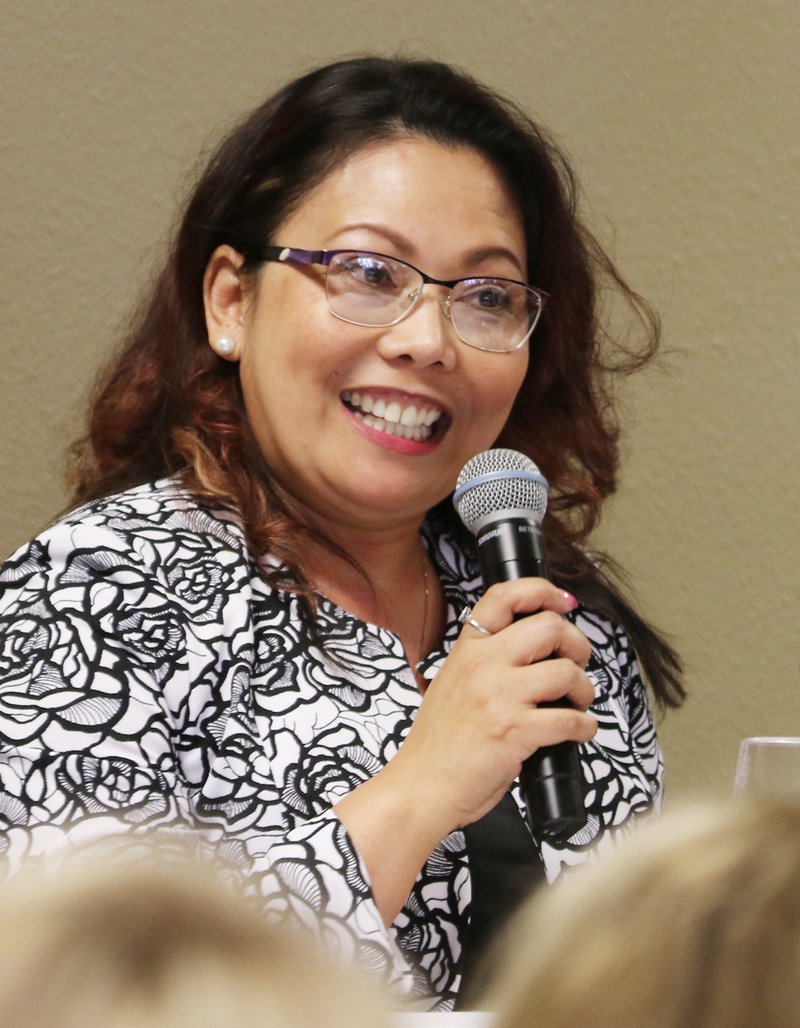Female leaders from throughout the area code gathered Thursday morning at the 209 Women’s Leadership Round Table, convening under the theme of “I am Woman” and sharing how their own self perception has shaped them into the trailblazers they are today.
The third annual breakfast panel, hosted by MNC Newspapers and 209 Magazine, featured four local women who embody empowerment: Adrenna Alkhas, marketing and communications director for the Stanislaus County Fair, a lecturer at Modesto Junior College and author; Rapunzel Amador-Lewis, president of her own engineering firm Amador Lewis, Inc.; Lani Dickinson, CEO of Emanuel Medical Center and Jodie Estarziau, Manteca Chief of Police.
During the round table discussion at the Hilmar Cheese Company Visitor Center, the four panelists shared with moderator and 209 Magazine editor Kristina Hacker how both their own as well as others’ view of themselves has shaped or changed their ability to set goals. While all have different backgrounds, each were able to find a strong sense of self by not only believing in their own capabilities, but also by surrounding themselves with peers who believed in them as well.

Amador-Lewis, whose family moved to the U.S. from the Philippines during her childhood, had to overcome being placed in English as a Second Language courses during elementary school — something that affected her self-perception early on. As life went on and she received acknowledgment and accolades, her perception changed.
“I think I needed to hear that from my peers. I needed that validation and from there I just soared up,” she said.
Others’ perceptions haven’t always been so kind, however, as Amador-Lewis said she frequently encounters sexism on the job.
“The site will be expecting an engineer…and as I start making my rounds they’ll tell me, ‘The office is the other way.’ And I say, ‘No, I belong here,’” she said. “There’s the immediate perception of the, ‘You’re not the engineer, are you?’
“It’s changed over the years and I’ve learned to kind of make a joke out of that.”
Dickinson always had a strong sense of self, she said, which allowed her to climb the corporate healthcare ladder. While she has been fortunate over her career to have had male bosses who support her, she hasn’t been afraid in the past to stand up for herself and “mow people down,” she laughed. Today, she oversees Emanuel amicably and finds the managing style to be much more beneficial.
“There’s a whole other set of skills and I want to show up differently in my life and in the relationships that matter,” Dickinson said. “I want to be more present, open and available, and I actually spend a lot more time developing other people so they don’t have to be on the path that I was on. You can still get to the top if that’s where you want to be…I’m different today in that I see that I can be very soft and that is just as powerful and gets just as many results.”
Alkhas had to overcome many of the same obstacles as Amador-Lewis. As an Assyrian that lived in Spain for five years, she said she came to Oakdale High School and was looked at as a “second-class citizen.” She was able to overcome that early self perception when she attended Cal Poly and found professors who believed in her, she said.

Flexibility is the number one priority she believes both male and female bosses should allow their female colleagues — something that all three of the male CEOs she has worked under have provided, she said — whether it be so that they can give birth or tend to their children and families. When it comes to support, women leaders need backing and encouragement from their fellow ladies the most, Alkhas added.
“We’re very hard on each other as females. We’re here today and we’re talking, but we have to act on it as well,” she said. “We can’t just talk the talk and not actually do what we are saying, so we have to be very supportive of each other.”
Estarziau’s self perception changed plenty throughout her career, she said, starting out as a young high schooler in Ripon’s Explorer program and growing into the Chief of Police she is today. She has doubts here and there, she said, but surrounded herself with people along the way who lifted her up, like a male lieutenant who supported her.
“I don’t even look at it as I’m a woman and they’re a man until somebody says, ‘Wow, how do you like that?’ And I go, ‘Of course, I really do enjoy it. One day at a time.’” Estarziau said. “And then I look further out to find goals or where I see the department going, and I have all these great ideas, so these perceptions that people have when you get into a role of leadership…people think they want change but they don’t.”
Being a female Chief comes with its fair share of challenges, she added, like having to choose between community events and spending time with her children. Each panelist has children and nodded their heads in agreement.
“This role has been compounded because…they know when I’m gone. What I try to do there to get over some of the self-doubt I have as a mother is I have cut out Facebook…and I try not to be distracted when I’m around my family so that when I’m with them, that time counts,” Estarziau said. “I’m going to wake up one day and they’re going to be out of the house and I’m going to regret this and say ‘What was I thinking that I forgot to be a parent and to be their mother?’
“I want my daughter to look at me and say, ‘That’s my mom and she’s a strong individual and look what I want to be.’ I want her to feel that she can do whatever she wants.”






